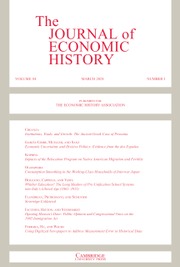-
- Get access
- Contains open access
- ISSN: 0022-0507 (Print), 1471-6372 (Online)
- Editors: Eric Hilt Department of Economics|Wellesley College|106 Central St|Wellesley, MA 02581, and Bishnupriya Gupta Department of Economics|University of Warwick, Coventry|CV4 7AL
- Editorial board
Arthur H. Cole Prize for the outstanding article
Neil Cummins, London School of Economics, was awarded the Arthur H. Cole Prize for the outstanding article published in this journal in the September 2020 to June 2021 issues, for:
“Where Is the Middle Class? Evidence from 60 Million English Death and Probate Records, 1892–1992,” published in the June 2021 issue of The Journal of Economic History. The editorial board selected the winner.
Latest articles
Economics blog

-
New to Cambridge in 2024: Finance and Society
- 08 December 2023,
- Cambridge University Press is pleased to announce that it will publish Finance and Society from January 2024, in partnership with the Finance and Society Network....

-
The Capital Structure Puzzle: What Are We Missing?
- 04 February 2022,
- The Holy Grail of corporate finance is a theory that explains the capital structure behavior of real-world firms. It’s been 63 years since Modigliani and Miller’s...

-
An interview with JHET Co-Editors Pedro Garcia Duarte and Jimena Hurtado
- 08 January 2022,
- Firstly, for anyone new to the journal can you briefly explain the journal’s mission and scope? The Journal of the History of Economic Thought (JHET) is the journal of the History of Economics Society and it promotes interest in and inquiry into the history of economics and related parts of intellectual history, facilitate communication and discourse among scholars and disseminate knowledge about the history of economics.…...




Tweets by EHA